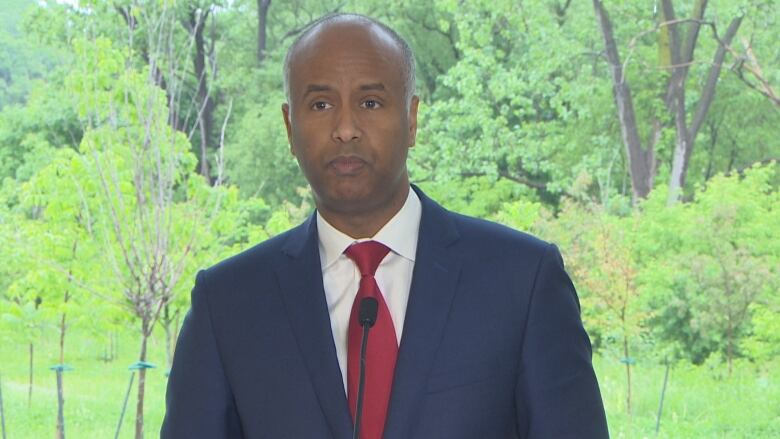Federal government to spend $73.2M on Toronto storm sewer project
New storm sewer system to be built in Fairbank and Silverthorn neighbourhoods

The federal government says it will contribute $73.2 million to the building of a new storm sewer system in Toronto, that the city says will benefit more than 11,500 residents in two neighbourhoods.
Ahmed Hussen, MP for York South-Weston and immigration minister, announced in Toronto on Monday that the money will go towards construction of what is called Fairbank-Silverthorn trunk storm sewer system project, part of the city's basement flooding protection program. The city is contributing $133.49 million.
The project involves the building of a new storm sewer system in the Fairbank and Silverthorn neighbourhoods. Fairbank is the area of Dufferin Street and Eglinton Avenue West, while Silverthorn is in the area of Black Creek Drive and Eglinton Avenue West.
According to the city,the project will protect 4,300 houses in four wards from sewer backups, provide basement flood protection to 230 hectares of city land, and will meanthe construction of13.6 kilometres of new storm tunnels and storm sewers.
Hussen said Toronto has experienced its share of serious flooding. He noted thatlast August, flooding interrupted Line 1subway service between Finch West and Wilson stations, submerging a streetcar.
Project to reduce flooding, protect drinking water
"Climate change is having a dramatic impact on our Canadians communities. Floods, wildfires and winter storms are getting worse and more frequent. The effects of these extreme weather events don't go away overnight. It takes time to rebuild and repair the damage that these events leave behind," he told reporters.
Hussen, who made the announcement at a news conference on behalf of federal Infrastructure Minister Franois-Philippe Champagne, said investments in city infrastructure help to build resilience and ensure cities, as well asbasement apartments, are better equipped to deal with extreme weather events.
"This project will help reduce flooding as well as the long term stress and time loss from work due to floods," he said. "Once completed, the project will improve the city of Toronto's ability to mitigate the effects of storms and floods for over 11,500 people. It will also protect the integrity of our drinking water."

The city says the project will reduce the risk of basement flooding by easing pressure on the existing "combined" sewer system during extreme weather. Combined means, during large storms, the sanitary sewage can come together with rainwater and can result in overflow of "unsavory material" and backup into homes.
The project will also help to protect public utilities and lower the impact on the environment of sewer overflows.
Project to help city address effects of climate change
Toronto Mayor John Tory welcomed the funding, saying storm sewerinfrastructure in the Fairbank and Silverthorn neighbourhoods was built more than 100 years ago.That means it has to be repaired and upgraded.
Tory said the investment is an example of a good thing than can come from "governments working together." He said the project is the largest single basement flooding project undertaken by the city.
"It is necessary for us to do these kinds of things in light of the effects of climate change," Torysaid.
"This project not only will reduce basement flooding, but will also help us to address the need to separate those two streams of waste and make sure we don't have those kinds of overflows into the environment, let alone into basements."
Julie Dzerowicz, MP for Davenport, said the federal government is investing in infrastructurein Ontario communities because such projects are essential to functioning cities.
"Solid modern infrastructure is vital to building strong Canadian communities and improving people's quality of life. We know that investing in mitigation projects is timely and necessary," she said.
The funding will come out of the federal Disaster Mitigation and Adaptation Fund, a $2-billion, 10-year program designed to build the infrastructure needed for communities to withstand natural disasters.












_(720p).jpg)


 OFFICIAL HD MUSIC VIDEO.jpg)
.jpg)



























































































